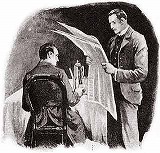“Ku Klux Klan. A name derived from the fanciful resemblance to the sound produced by cocking a rifle. This terrible secret society was formed by some ex-Confederate soldiers in the Southern states after the Civil War, and it rapidly formed local branches in different parts of the country, notably in Tennessee, Louisiana, the Carolinas, Georgia, and Florida. Its power was used for political purposes, principally for the terrorizing of the negro voters and the murdering and driving from the country of those who were opposed to its views. Its outrages were usually preceded by a warning sent to the marked man in some fantastic but generally recognized shape - a sprig of oak-leaves in some parts, melon seeds or orange pips in others. On receiving this the victim might either openly abjure his former ways, or might fly from the country. If he braved the matter out, death would unfailingly come upon him, and usually in some strange and unforeseen manner. So perfect was the organization of the society, and so systematic its methods, that there is hardly a case upon record where any man succeeded in braving it with impunity, or in which any of its outrages were traced home to the perpetrators. For some years the organization flourished in spite of the efforts of the United States government and of the better classes of the community in the South. Eventually, in the year 1869, the movement rather suddenly collapsed, although there have been sporadic outbreaks of the same sort since that date.
“You will observe,” said Holmes, laying down the volume, “that the sudden breaking up of the society was coincident with the disappearance of Openshaw from America with their papers. It may well have been cause and effect. It is no wonder that he and his family have some of the more implacable spirits upon their track. You can understand that this register and diary may implicate some of the first men in the South, and that there may be many who will not sleep easy at night until it is recovered.”
“Then the page we have seen- -”
“Is such as we might expect. It ran, if I remember right, ‘sent the pips to A, B, and C’ - that is, sent the society’s warning to them. Then there are successive entries that A and B cleared, or left the country, and finally that C was visited, with, I fear, a sinister result for C. Well, I think, Doctor, that we may let some light into this dark place, and I believe that the only chance young Openshaw has in the meantime is to do what I have told him. There is nothing more to be said or to be done to-night, so hand me over my violin and let us try to forget for half an hour the miserable weather and the still more miserable ways of our fellowmen.”
It had cleared in the morning, and the sun was shining with a subdued brightness through the dim veil which hangs over the great city. Sherlock Holmes was already at breakfast when I came down.
“You will excuse me for not waiting for you,” said he; “I have, I foresee, a very busy day before me in looking into this case of young Openshaw’s.”
“What steps will you take?” I asked.
“It will very much depend upon the results of my first inquiries. I may have to go down to Horsham, after all.”
“You will not go there first?”
“No, I shall commence with the City. Just ring the bell and the maid will bring up your coffee.”
As I waited, I lifted the unopened newspaper from the table and glanced my eye over it. It rested upon a heading which sent a chill to my heart.

“Holmes,” I cried, “you are too late.”
“Ah!” said he, laying down his cup, “I feared as much. How was it done?” He spoke calmly, but I could see that he was deeply moved.
“My eye caught the name of Openshaw, and the heading ‘Tragedy Near Waterloo Bridge.’ Here is the account: